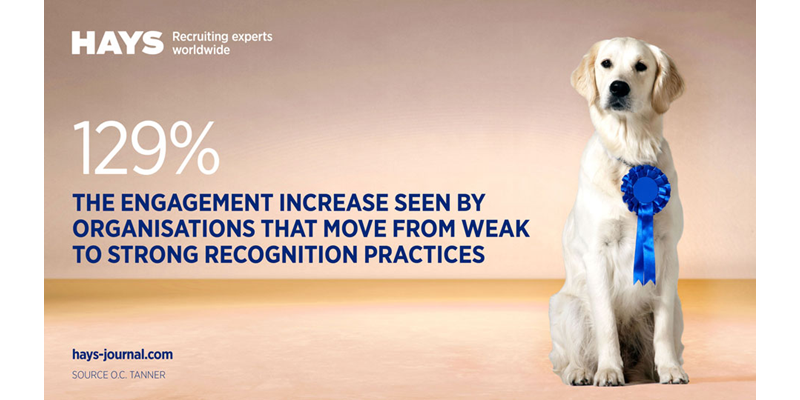Professionals want praise not perks

Would you rather your boss praised your successes or offered you unwanted perks? According to recruiting experts Hays, most employees prefer the former, which is why organisations could forgo headline-grabbing perks in favour of a simple ‘thank you’ and recognition for a job well done.
“Headline-grabbing perks have been a trend for many organisations in recent years,” says Jack Leung, Hays in Hong Kong. “However, when it comes to attracting and retaining the top talent, improving staff recognition is usually a lot more beneficial.”
In recent years, unusual perks and rewards have increasingly been used as differentiators for many organisations. From taking 6,400 staff on holiday, as Chinese conglomerate Tiens Group did in 2015, to offering egg freezing to female employees as Apple and Facebook have done, businesses have looked for new ways to attract and retain staff.
But, according to Hays, the answer is much simpler.
The 2017 Global State of Employee Engagement study by Officevibe, which surveyed 1,000 organisations in 157 countries, found that 63 per cent of employees feel they don’t get enough praise, with eight per cent never receiving it.
“The fact that so many workplaces are foregoing recognition is concerning, given the impact doing so can have on a business, including its culture,” says Jack.
As O.C. Tanner’s Alexander Lovell, Manager of Institute Research & Assessment, explains in the recent Hays Journal, “Workplace culture comprises six elements: purpose, opportunity, success, appreciation, wellbeing and leadership.
“Recognition has a tangible impact on each one of them. When it is used to improve culture, we have seen a significant impact on an organisation’s ability to retain, engage and attract talent. For example, we saw engagement increase 129 per cent in organisations that move from weak to strong recognition practices. Additionally, people stay with an organisation two to four years longer when best practice service recognition is implemented.”
“Employee appreciation doesn’t have to be expensive to be beneficial,” explains Jack. “Instead, it’s more about taking the time to recognise success and make your employees feel valued. It should be personal and therefore more effective. Good bosses know what motivates and engages their staff and will take the time to treat them as individuals.”
Here’s Hays’ advice on successful staff recognition:
• Say ‘thank you’: As Alexander explains, “A deliberate ‘thank you’ increases an employee’s feeling of appreciation by 116 per cent, spontaneous praise increases it by 172 per cent, while formal recognition increases appreciation by 355 per cent.”
• Recognition from the top: Effective employee recognition must be led from the top, with the employer or manager recognising the contributions of employees. This could be in tangible ways, such as presenting an award, or intangible ways, such as verbal praise.
• Don’t forget peer-to-peer recognition: Peer-to-peer recognition sees everyone in the organisation play a part in recognising the often quiet but critical high performers.
• Utilise internal social media: Many modern recognition programmes use internal social media, such as recognition-specific tools or apps, to instantly recognise workers who go the extra mile, with the results displayed on the staff intranet or company social channels so that anyone can see them.
• Annual events: Annual recognition awards events single out the top performers, for example in the customer service arena or for demonstrating company values. The effect is often to inspire other employees to do the same.
In one final tip, Jack points out that a successful recognition program involves recognising not just what an employee has achieved but also how they achieved it. “Employers need to be clear about what they are recognising people for,” he explains. “All too often, recognition is for a successful outcome. It should also focus on how the employee achieved the desired result.”
This issue is explored further in the latest Hays Journal.
- Ends -
Hays, the world’s leading recruiting experts in qualified, professional and skilled people.
Hays is located in Hong Kong at 6604-06, 66/F, ICC, 1 Austin Road West, West Kowloon, Hong Kong.
Follow Hays on LinkedIn - The #1 Recruiter on LinkedIn globally
About Hays
Hays plc (the "Group") is a leading global professional recruiting group. The Group is the expert at recruiting qualified, professional and skilled people worldwide, being the market leader in the UK and Asia Pacific and one of the market leaders in Continental Europe and Latin America. The Group operates across the private and public sectors, dealing in permanent positions, contract roles and temporary assignments. As at 30 June 2019 the Group employed 11,500 staff operating from 265 offices in 33 markets across 20 specialisms. For the year ended 30 June 2019:
– the Group reported net fees of £1,129.7 billion and operating profit (pre-exceptional items) of £248.8 million;
– the Group placed around 81,000 candidates into permanent jobs and around 254,000 people into temporary assignments;
– 18% of Group net fees were generated in Australia & New Zealand, 27% in Germany, 23% in United Kingdom & Ireland and 32% in Rest of World (RoW);
– the temporary placement business represented 57% of net fees and the permanent placement business represented 43% of net fees;
– Hays operates in the following countries: Australia, Austria, Belgium, Brazil, Canada, China, Colombia, Chile, the Czech Republic, Denmark, France, Germany, Hungary, India, Ireland, Italy, Japan, Luxembourg, Malaysia, Mexico, the Netherlands, New Zealand, Poland, Portugal, Romania, Russia, Singapore, Spain, Sweden, Switzerland, UAE, the UK and the USA




